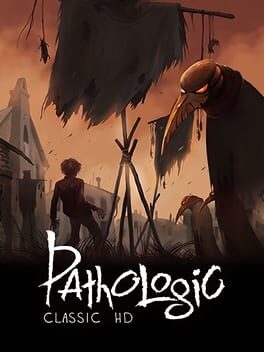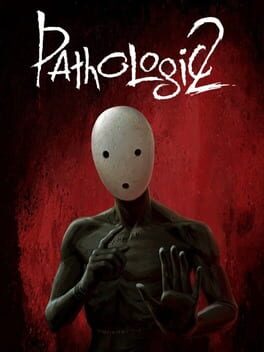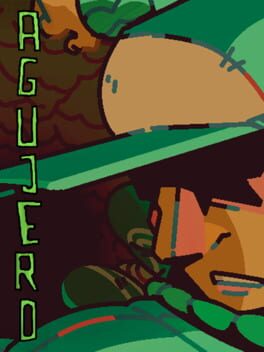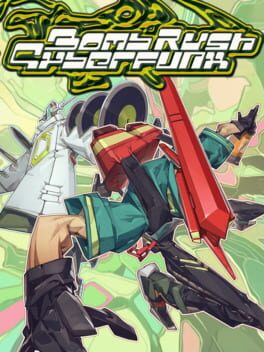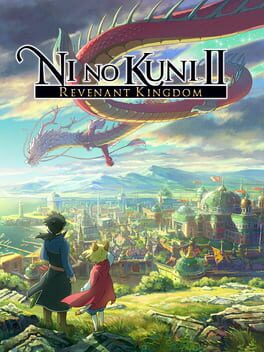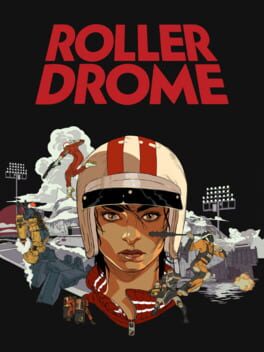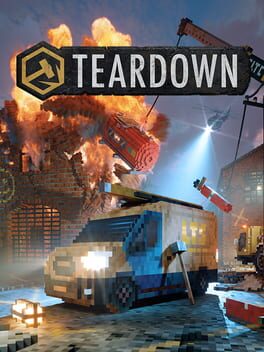Gutinho
13 reviews liked by Gutinho
Pathologic 2
2019
Agujero
2024
Bomb Rush Cyberfunk
2023
nnk2 es como cuando vos y tus compañeritos se parten el lomo haciendo el trabajo practico en grupo y despues el hijo de puta que tenia que hacer las cinematicas falta y desaprueban pero te llevas la materia vos solo y tenes que estudiar en verano mientras los demas van a la pileta fernandez conchuda de mierda no te costaba nada aprobarnos
Rollerdrome
2022
Rollerdrome
2022
I actually beat Rollerdrome back in March and was quite enamored at first, but I've since cooled down on it somewhat. A quick replay today has only confirmed my suspicions that there's unfortunately a lot left to be desired. Feel free to take my word here with a grain of salt: I'm not a particularly huge Tony Hawk fan and was more or less playing this as part of a warm-up via Jet Set Radio-likes (since Bomb Rush Cyberfunk is coming out in less than a week, and I replayed the original Jet Set Radio right before this). Still, if I had to put my finger on why this didn't hit the mark the second time around, my best guess would be that Rollerdrome doesn't understand how to create an engaging difficulty curve, and here are some of my theories as to why:
- Progression: Rollerdrome locks its stages behind completing challenges (collect all the tokens, do a certain trick while killing a certain enemy, rack up enough points, etc), with ten challenges per stage and sixty completed challenges required to unlock the finals. This is supposed to incentivize players to tackle as many challenges as possible while going through stages, but in reality what I found myself doing was farming the earlier stages for the easiest challenges to get the base completion requirement out of the way, and throwing away dry runs to farm the more manageable challenges at the beginning before resetting and running through the stages proper. This unfortunately feels like an artificial implementation of coercing me to explore its mechanics when I was usually more concerned with straight efficiency regarding combat.
- Tricks: You need to perform tricks constantly in Rollerdrome to restore your ammo, and tricks are also a way to quickly rack up points in-between shooting to exploit your current combo multiplier. Again though, I found tricks to be unnecessarily complicated and superfluous outside of doing the required tricks to complete necessary challenges: if you don't care about your score, then all you have to do for quick ammo restoration is to just hold the stick forward and perform the same grab/flip/spin while not in combat, or just spend your time grinding on rails/edges and firing since you'll automatically regain ammo for grinding up to a certain point. It also doesn't help that I found the inputs for more complex tricks a bit fiddly and perfect dodges refresh some of your ammo anyway, reducing the reliance upon tricks. Speaking of which...
- Dodge/Super Reflex: The dodge is a little too good in Rollerdrome. You can basically invincible frame roll at any time in the game (including in mid-air and while grinding), outside of a few frames right after the roll animation ends as far as I can tell. This not only provides a reliable method for quickly getting out of danger, but also you can roll in any direction to quickly alter your momentum and enter Super Reflex if you activate bullet-time right as you perfect dodge (that is, dodging in the first few frames of an active enemy attack). To summarize, this strategy easily gets you ammo refills, allows for relative invincibility when confronted by a barrage of attacks, and powers up your shots while in Super Reflex, which as a result makes Rollerdrome almost feel too reactive as opposed to proactive since it's far too advantageous to not abuse this to safely and quickly wipe out waves.
- Stages: Rollerdrome only has 11 stages, and quite a few of these stages are just repeated locales with few hazards outside of the enemies and a lot of empty, open space outside of a few trick ramps and grind rails/edges. A bit more variety in the set design (and more walls to wall-ride, which I thought was a little underutilized) would have been appreciated since by halfway through, some of the arenas started to bleed into one another for me.
- Laser: I'm fine with most of the weapon balance in Rollerdrome, but the Z-11 (the in-game laser gun) is an exception. The main caveat to using the Z-11, aside from the three shot capacity (still more than the grenade launcher though), is that you can't use aim assist to automatically lock on to foes with it and thus must manually point your reticle at them. Not a very difficult task though, since Reflex gives you more than enough reaction time and the reticle turns red as soon as you hover over a target. Because the shotgun and pistol are limited somewhat by range for aim assist (especially the shotgun due to perfect slug shots), the laser is a godsend: it bypasses this system entirely and lets you snipe foes from across the arena, taking out most enemies after a double charge and can also pierce through multiple enemies at a time. It further disrupts this balance because the Z-11 is unlocked halfway through, meaning the game's earlier combat/combo challenges are a lot more difficult without it at first but often rather trivial once you've unlocked it.
- Boss fights: I've already mentioned that Rollerdrome's dodge roll is a bit overcentralizing, but nowhere does this become more evident than during the two boss fights, shifting the prevailing strategy from any semblance of ammo management/route planning to just basic bait and punish. Simply wait for enemy attacks, dodge to regain ammo/enter Super Reflex to finish off goons, and then approach the big robot to deal damage and enter the next phase. There's no scoring optimization or crazy tricks/maneuvering involved, and as a result, these tend to be pretty dry affairs that could have been removed from the game entirely with little value lost.
I certainly get the appeal of Rollerdrome, given its potential for optimization to maximize the combo meter and quickly speedrun stages, but unfortunately I find that the game doesn't get harder, but rather gets longer with more enemies that take more hits and throw out more attacks. Even so, I had enough fun constantly filling foes with lead in slow-mo, but even this thrill began to wear itself thin an hour in. I can't help but feel that the separate movement and combat mechanics are undercooked despite how promising "Tony Hawk with bullet-time gunplay" sounds on paper. More power to those who find the core gameplay engaging enough to try and complete all the challenges + the "Out for Blood" post-game replay with stricter margins: as for me, I'm content with putting this down after a few hours and completing Finals with a C rank. Rollerdrome is by no means a bad game, but I know Roll7 is capable of so much more.
- Progression: Rollerdrome locks its stages behind completing challenges (collect all the tokens, do a certain trick while killing a certain enemy, rack up enough points, etc), with ten challenges per stage and sixty completed challenges required to unlock the finals. This is supposed to incentivize players to tackle as many challenges as possible while going through stages, but in reality what I found myself doing was farming the earlier stages for the easiest challenges to get the base completion requirement out of the way, and throwing away dry runs to farm the more manageable challenges at the beginning before resetting and running through the stages proper. This unfortunately feels like an artificial implementation of coercing me to explore its mechanics when I was usually more concerned with straight efficiency regarding combat.
- Tricks: You need to perform tricks constantly in Rollerdrome to restore your ammo, and tricks are also a way to quickly rack up points in-between shooting to exploit your current combo multiplier. Again though, I found tricks to be unnecessarily complicated and superfluous outside of doing the required tricks to complete necessary challenges: if you don't care about your score, then all you have to do for quick ammo restoration is to just hold the stick forward and perform the same grab/flip/spin while not in combat, or just spend your time grinding on rails/edges and firing since you'll automatically regain ammo for grinding up to a certain point. It also doesn't help that I found the inputs for more complex tricks a bit fiddly and perfect dodges refresh some of your ammo anyway, reducing the reliance upon tricks. Speaking of which...
- Dodge/Super Reflex: The dodge is a little too good in Rollerdrome. You can basically invincible frame roll at any time in the game (including in mid-air and while grinding), outside of a few frames right after the roll animation ends as far as I can tell. This not only provides a reliable method for quickly getting out of danger, but also you can roll in any direction to quickly alter your momentum and enter Super Reflex if you activate bullet-time right as you perfect dodge (that is, dodging in the first few frames of an active enemy attack). To summarize, this strategy easily gets you ammo refills, allows for relative invincibility when confronted by a barrage of attacks, and powers up your shots while in Super Reflex, which as a result makes Rollerdrome almost feel too reactive as opposed to proactive since it's far too advantageous to not abuse this to safely and quickly wipe out waves.
- Stages: Rollerdrome only has 11 stages, and quite a few of these stages are just repeated locales with few hazards outside of the enemies and a lot of empty, open space outside of a few trick ramps and grind rails/edges. A bit more variety in the set design (and more walls to wall-ride, which I thought was a little underutilized) would have been appreciated since by halfway through, some of the arenas started to bleed into one another for me.
- Laser: I'm fine with most of the weapon balance in Rollerdrome, but the Z-11 (the in-game laser gun) is an exception. The main caveat to using the Z-11, aside from the three shot capacity (still more than the grenade launcher though), is that you can't use aim assist to automatically lock on to foes with it and thus must manually point your reticle at them. Not a very difficult task though, since Reflex gives you more than enough reaction time and the reticle turns red as soon as you hover over a target. Because the shotgun and pistol are limited somewhat by range for aim assist (especially the shotgun due to perfect slug shots), the laser is a godsend: it bypasses this system entirely and lets you snipe foes from across the arena, taking out most enemies after a double charge and can also pierce through multiple enemies at a time. It further disrupts this balance because the Z-11 is unlocked halfway through, meaning the game's earlier combat/combo challenges are a lot more difficult without it at first but often rather trivial once you've unlocked it.
- Boss fights: I've already mentioned that Rollerdrome's dodge roll is a bit overcentralizing, but nowhere does this become more evident than during the two boss fights, shifting the prevailing strategy from any semblance of ammo management/route planning to just basic bait and punish. Simply wait for enemy attacks, dodge to regain ammo/enter Super Reflex to finish off goons, and then approach the big robot to deal damage and enter the next phase. There's no scoring optimization or crazy tricks/maneuvering involved, and as a result, these tend to be pretty dry affairs that could have been removed from the game entirely with little value lost.
I certainly get the appeal of Rollerdrome, given its potential for optimization to maximize the combo meter and quickly speedrun stages, but unfortunately I find that the game doesn't get harder, but rather gets longer with more enemies that take more hits and throw out more attacks. Even so, I had enough fun constantly filling foes with lead in slow-mo, but even this thrill began to wear itself thin an hour in. I can't help but feel that the separate movement and combat mechanics are undercooked despite how promising "Tony Hawk with bullet-time gunplay" sounds on paper. More power to those who find the core gameplay engaging enough to try and complete all the challenges + the "Out for Blood" post-game replay with stricter margins: as for me, I'm content with putting this down after a few hours and completing Finals with a C rank. Rollerdrome is by no means a bad game, but I know Roll7 is capable of so much more.
Cocoon
2023
Teardown
2020
0_abyssalSomewhere
2018
quiet... and LOUD. the silence of the dark glides like oil between small islands of thrumming sound and jagged stabs of screaming steel. echoes of dark souls, shadow tower (abyss), BLAME! (& other nihei), eraserhead, shinya tsukamoto, killer7, silent hill, ico, angel's egg... prometheus? post-industrial, rusted out and haunted, this 'somewhere' could be anywhere, endless. headphones recommended — do brace yourself, though. very much looking forward to tower of no one.
